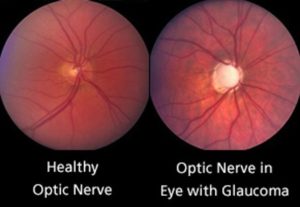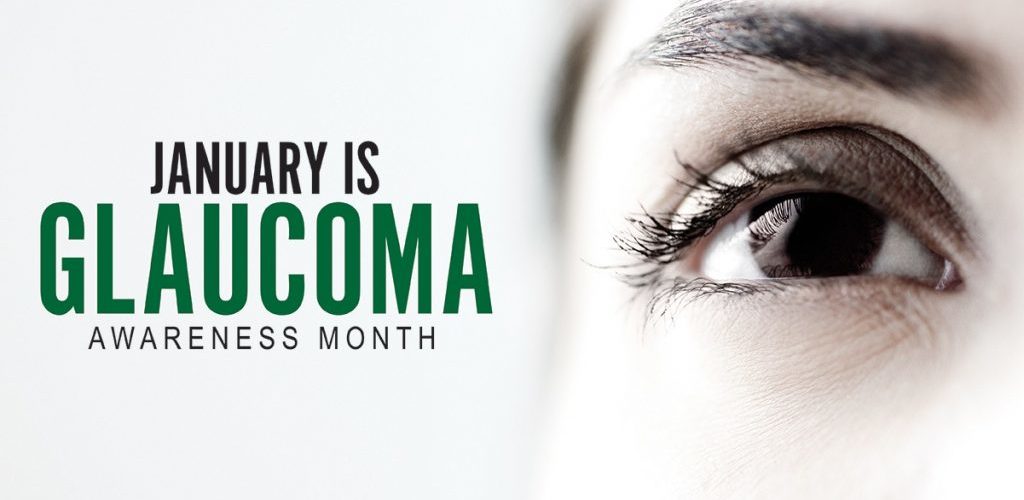Glaucoma awareness month is January.
Glaucoma is a group of diseases that damage the optic nerve of the eye. As you can see in the picture, the front of the eye is on the left and the optic nerve comes out of the back and sends images back to the brain. When there is damage to the optic nerve, it can cause permanent vision loss if untreated.

Glaucoma can be caused when the eye produces too much internal fluid, or when the drainage pathway is blocked.

As you can see in this figure, the left shows a normal drainage pathway out of the anterior chamber, where the fluid is produced and stored. On the right, there is a blockage that doesn’t allow the fluid to drain and therefore, the pressure builds up inside that eye. This can cause damage to the optic nerve. The effects of pressure on the optic nerve differ from person to person. Some people may get optic nerve damage at low-pressure levels while others can tolerate higher pressures.
Glaucoma affects over 2 million people in the United States. Anyone can develop glaucoma, but here are some risk factors:
- Age: 60 +
- Race: African American and Hispanic
- African Americans are 3X more likely to get glaucoma and 4X more likely to cause blindness vs. Caucasians
- Family History
- Corneal Thickness
- How thick the front part of your eye is can affect the pressure reading we get. Thicker corneas will read artificially high and thinner corneas will read artificially low.
- Previous Trauma
- Can affect fluid production, flow and eye pressure
As you can see, there are many different risk factors that we don’t have any control over!
Early stages of glaucoma do not have any symptoms. There is no pain and vision is normal. As the disease progresses, the visual field (peripheral vision) will change. It usually takes a long time for this peripheral vision change and the change is so gradual that it is not noticed. Here is a picture that shows how we see the visual field when we test it in the office on the left and on the right, what a person would notice when they are looking straight ahead as the disease progresses.


Early detection and treatment can reduce and slow the progression of vision loss. Unfortunately, vision loss caused by glaucoma cannot be restored.
What can you do about this if your risk factors are set and there are no symptoms? Get a comprehensive eye examination yearly! In a routine comprehensive exam, we would check vision, eye pressure, do a screening peripheral vision test and look at the optic nerve. In our exams, we document by photo what the optic nerve looks like in order to have a comprehensive baseline to refer back to. A picture really is worth a thousand words! If there are any risk factors, or anything looks unusual, we have the next lineup of tests that we can do to follow up. We can look for any blockage, see how thick the cornea is and do an actual scan of the optic nerve to see if it’s outside of normal range for that age group. There is also a more detailed peripheral vision test that will show if there is any damage already done. If repeated tests show damage, we will make an official diagnosis and begin treatment.
Before going into treatment options, here is a picture of a healthy optic nerve and one that has damage due to glaucoma. As you can see, the area inside the optic nerve (small circle) looks paler and seems to have a larger hole on the damaged nerve. This is due to lost nerves not being able to “fill” the hole as it does in the healthy optic nerve.

If you are given a diagnosis of glaucoma, here are ways that it can be treated to try to prevent progression. The first line is eye drops that reduce the eye pressure by causing the eye to make less fluid or helping drain the fluid from the eye. Those who are on glaucoma medication most likely will need the medication throughout their lifetime and need to follow up with their eye doctor regularly.
If multiple medications do not keep the pressure under control, then a surgical referral is usually warranted. Glaucoma specialists are ophthalmologists that only deal with glaucoma. They have done extensive training after their residency in eyes. There are a variety of surgical options that are done. Most surgical options either open the drainage to allow more fluid to pass or make a new opening for the fluid to leave.
In summary, Glaucoma is a group of diseases that affects the optic nerve. Anyone can get glaucoma at any stage of life. It can cause permanent vision loss so early detection is key to preventing blindness. Yearly eye exams from Verona Vision Care will be able to keep an “eye” (pun intended) out for any changes that could lead to glaucoma.




